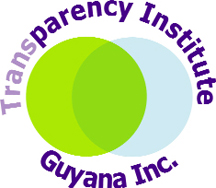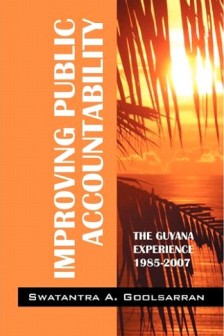Transparency Institute Guyana in collaboration with Dr Anand Goolsarran is pleased to invite members of the public to the launching of his seminal work Improving Public Accountability: The Guyana Experience 1985-2007. The public launch will take place on Tuesday October 9, 2012 at the Marian Academy, Carifesta Avenue, Georgetown at 5 pm. All are invited.
 Dr Anand Goolsarran is a Vice President of Transparency Guyana and a retired Auditor General of Guyana. In writing this excellent account he has brought to bear his tremendous experience in public accountability and financial reporting but it is also an academic work of distinction culled and expanded from his dissertation for his Doctorate of Business Administration submitted to the Robert Kennedy College in Switzerland. Dr Goolsarran has over 25 years’ experience in the field. He worked in the Audit Office of Guyana from 1987 to 2005 during which he served as Auditor General from 1990 to 2005. He is credited with helping to restore public accountability from 1992 through his efforts as Auditor General of Guyana.
Dr Anand Goolsarran is a Vice President of Transparency Guyana and a retired Auditor General of Guyana. In writing this excellent account he has brought to bear his tremendous experience in public accountability and financial reporting but it is also an academic work of distinction culled and expanded from his dissertation for his Doctorate of Business Administration submitted to the Robert Kennedy College in Switzerland. Dr Goolsarran has over 25 years’ experience in the field. He worked in the Audit Office of Guyana from 1987 to 2005 during which he served as Auditor General from 1990 to 2005. He is credited with helping to restore public accountability from 1992 through his efforts as Auditor General of Guyana.
In his book Dr Goolsarran covers interesting and topical areas such as:
1. The role of the public accounts committee of Parliament
2. Financial management in government
3. The legislative audit
4. Corruption in government
5. The integrity commission
6. Creation of the Guyana Revenue Authority
7. The Public Procurement Commission
8. The Procurement Act 2003
9. The Fiscal Management and Accountability Act 2003
10. The Audit Office of Guyana
12. The Audit Act 2004
The author writes as follows:
 Guyana has had a sad history of public accountability since it attained its independence from Britain in 1966. A culture of ‘non-accountability’ had developed at almost all levels of government, so much so that when the new government took over in 1992, there was no reporting of the Government’s financial stewardship for ten years. Public accountability was restored with effect from 1992 primarily due to the efforts of the AOG. There is now annual financial reporting which is reviewed by the Audit Office of Guyana before being presented to the Legislature.
Guyana has had a sad history of public accountability since it attained its independence from Britain in 1966. A culture of ‘non-accountability’ had developed at almost all levels of government, so much so that when the new government took over in 1992, there was no reporting of the Government’s financial stewardship for ten years. Public accountability was restored with effect from 1992 primarily due to the efforts of the AOG. There is now annual financial reporting which is reviewed by the Audit Office of Guyana before being presented to the Legislature.
There are, however, various media and other reports suggesting that the state of public accountability is once again on the decline, particularly since 1997. For example, a review of the AOG reports on the public accounts for the years 1997 to 2005 revealed a progressive deterioration in the management of the country’s finances.
The main purpose of this study was to review the state of public accountability in Guyana in 1985 and compare it with international best practices. Attempts were also made to ascertain the reasons for any shortcomings. The study traced the efforts from 1985 to 2007 to improve public accountability and analysed the quality and effectiveness of such efforts. Arising out of the study, a number of recommendations have been made to address the deficiencies that have been identified.
An effective system of public accountability requires an up-to-date financial management system out of which can be derived periodic financial reporting that is timely and reflective of international best practices. In addition, an independent and credible Legislative Audit serving the public interest, a competent and impartial Public Accounts Committee, and a responsive and enlightened government are indispensable to the maintenance of the highest standards of public accountability.
Corruption in Guyana has become a hotly debated topic before and after the last national elections. The state media through the television station NCN recently hosted a controversial 7-part live discussion on corruption while simultaneously engulfed in internal investigations of corruption. The public debate on corruption has been fuelled by numerous scandals, controversies and exposes in the media. The loss of the parliamentary majority by the ruling PPP has also seen corruption issues being taken to the opposition controlled Parliament over the past year. Ranking alongside the public discussion on corruption has been fiercely debated positionson the independent functioning of the Office of the Auditor General with the wife of the Finance Minister holding a senior position in that Office thus raising a conflict of interest issue. Other fiercely debated issues are the non-appointment of the Public Procurement Commission and the Integrity Commission which are all issues that has once again risen to the fore since the government no longer has a majority in parliament. Knowledge and discussion on these bodies, analysed by Dr Goolsarran, are resonating once again with the public since it is the belief of many that the change in the parliamentary dispensation will bring about some meaningful change to fight corruption.
Within this context Dr Goolsarran’s book is eminently relevant today in the current political and parliamentary dispensation. It should be read by members of the government and members of the opposition; public officials and parliamentarians; public commentators and ordinary members of the public. It puts into frightening perspective the stark reality of how we have come to be characterized as a nation battling severe issues of corruption.
If you want to understand how Guyana has ended up with systemic weaknesses which inevitably fuels the monster of corruption then read this book. Guyana remains a fragile democracy with weak and weakened institutions. Chronic corruption has resulted in Guyana continuing to rank poorly in Transparency International’s Annual Corruption Perception Index. In 2011 Guyana was ranked 134 out of 182 countries with a poor score of 2.5 out of 10 coming in at the bottom of the English-speaking Caribbean with only Haiti ranking worse. Dr Goolsarran’s work highlights with academic analysis and professional precision the frank and harsh reality of how a country fares where there is poor financial management and accountability.
If there is any word that can adequately sum up the importance of Dr. Goolsarran’s work it would be relevance. The book is a roaring read of Guyana’s current challenges. The daily travails of those seeking a cleaner society through enhanced transparency and accountability are more than adequately distilled and presented through the author’s research and authoritative views.
We look forward to seeing you at the book launch on October 9 at 5 pm at Marian Academy.
Email: [email protected]
Facebook: Transparency Institute Guyana
Twitter: @Transparency_GY

